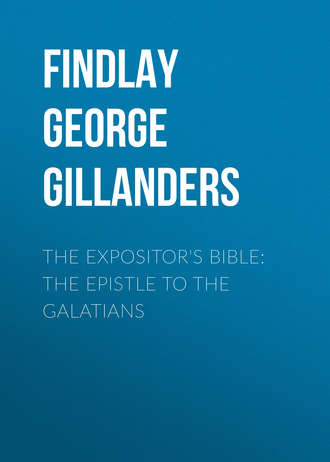 полная версия
полная версияThe Expositor's Bible: The Epistle to the Galatians
95
Gen. xii. 2, 3; xv. 2-6; xvii. 4-8, 15-21; xxii. 16-18.
96
Ch. iv. 21-31; Rom. iv. 17-22; comp. Heb. xi. 11, 12.
97
Rom. xi.
98
Luke i. 54, 55, 68-73.
99
Τῶν παραβάσεων: the definite article can scarcely mean less than this.
100
Comp. the reference to this word in Chapter IX., p. 143.
101
Acts vii. 53: comp. διαταγὰς ἀγγέλων and διαταγεὶς δι' ἀγγέλων. Stephen's last words may well have lingered in the ear of Saul. From the lips of Stephen, they were something of an argumentum ad hominem.
102
A doubtful citation at the best: the reading of the LXX is more to the point than the Hebrew text.
103
See the quotations from Jewish writers to this effect given by Meyer or Lightfoot.
104
Comp. Heb. ii. 2-4; also Col. ii. 15: "(scil. God) having stripped off the principalities and powers" – the earlier forms of angelic mediation. The writer may refer on this latter passage to his note in the Pulpit Commentary, also to The Expositor, 1st series, x. 403-421.
105
But the title "mediator" belongs to Christ, given by Paul himself – the "one mediator between God and men, the man Christ Jesus" (1 Tim. ii. 5). (Comp. Heb. viii. 6; ix. 15; xii. 24.) Christ is so styled however under an aspect very different from that in which the word appears here. "There is one mediator," the Apostle writes in 1 Timothy, "who gave Himself a ransom for all," the one atoning mediator. But Christ's manifestation of God was direct, as that of Moses was not. His Person does not come between men and God, like that of the Sinaitic mediator; it brings God into immediate contact with men. Moses acted for a distant God: Christ is Immanuel, God with us. On the human side Christ is mediator (ἄνθρωπος Χριστὸς Ἰησοῦς); He acts for individual men with God. On the Divine side, He is more than mediator, being God Himself.
106
Matt. xix. 8. Comp. Ezek. xx. 25.
107
Comp. 1 Cor. viii. 6; 1 Tim. ii. 5; also Mark xii. 29, 30; Jas. ii. 19.
108
Hence the present participle, συγκλειόμενοι (Revised reading of ver. 23), in combination with the imperfect of the foregoing verb, ἐφρονρουμεθα.
109
The phrase faith in Christ Jesus is a link between this Epistle and those of the third and fourth groups. Comp. Col. i. 4; Eph. i. 15; 1 Tim. iii. 13; 2 Tim. i. 13; iii. 15. More frequently in this connection our "in" represents εἰς (into), not ἐν as here.
110
Rom. vi. 1, 2; Tit. iii. 4-7 ("not of works … that we had done)."
111
Comp. Eph. ii. 15; iv. 13; but neuter in ii. 14.
112
Surely the world of men, not the cosmical elements; comp. Col. ii. 8, 20 (where rudiments of the world is parallel to tradition of men); also Gal. vi. 14; Heb. ix. 1. 1 Cor. iii. 1-3 supplies an interesting parallel: those who are babes in Christ, are so far carnal and walk according to man, animated by the spirit of this world (1 Cor. ii. 12).
113
Comp. Rom. i. 3, 4; ix. 5; 2 Cor. xiii. 4; Eph. iv. 9, 10; Ph. ii. 6-8; Col. i. 15, 18; ii. 9; 1 Tim. iii. 16.
114
Matt. x. 20; Luke xi. 13; John xiv. 16; Acts i. 4, 5.
115
John xiv. 17; the present (ἐστίν) is the preferable reading. See Westcott ad loc.
116
Comp. Rom. viii. 31-35; Acts xi. 17.
117
John xii. 26; xvii. 24; Rev. iii. 21; Phil. i. 23; Col. iii. 4; 1 Pet. v. 1.
118
For the rendering of this clause, see the exposition which follows.
119
Comp. 2 Cor. ii. 4; vii. 8.
120
Comp. 1 Thess. i. 5; ii. 7, 8.
121
1 Cor. ii. 3; 2 Cor. iv. 7; x. 1, 10; xi. 6.
122
Comp. 2 Cor. xii. 7-10, referring apparently to the first outbreak of this mysterious affliction.
123
Comp. Matt. xviii. 9.
124
Ζηλόω, to have zeal towards a person or thing, to affect (A.V.: in its older English sense of seeking, paying regard to any one).
125
The full stop placed in the English Version at the end of ver. 18, on this view, is out of place.
126
Kalisch, Commentary, on Genesis xxi. 9.
127
Comp. Heb. xi. 11, 12; 1 Pet. iii. 6.
128
Paul writes "the Sinai mountain" (τὸ Σινᾶ ὄρος) in tacit opposition to the other, familiar Mount Zion (Hofmann in loc.). In Heb. xii. 22 the same inversion appears, with the same significance.
129
The reading of this clause is doubtful. The ancient witnesses disagree. Dr. Hort suggests that the Revised reading – the best attested, but scarcely grammatical – may be due to a primitive corruption, ΤΗ for ΕΠ (ἐλευθερίᾳ). This emendation gives an excellent and apposite sense: for (with a view to) freedom Christ set us free. The phrase ἐπ' ἐλευθερίᾳ is found in ver. 13, and would gain additional force there, if read as a repetition of what is affirmed here. The confusion of letters involved is a natural one; and once made at an early time in some standard copy, it would account for the extraordinary confusion of reading into which the verse has fallen. If conjectural emendation may be admitted anywhere in the N. T., it is legitimate in this instance.
130
Comp. John xv. 5, 6, where in ἐβλήθη, ἐξηράνθη, there is a like summary aorist.
131
Comp. 2 Pet. iii. 17; for the figure suggested, Eph. iv. 14; 1 Tim. i. 19.
132
Acts xxiii. 6; xxiv. 15; xxvi. 6-8; comp. John vi. 39, 40, 44.
133
"Working through love," not wrought (R.V. margin). The latter rendering of the participle is found in some of the Fathers, and is preferred by Romanist interpreters in the interest of their doctrine of fides formata. Paul's theology and his verbal usage alike require the middle sense of this verb, adopted by modern commentators with one consent. The middle voice implies that through love faith gets into action, is operative, efficacious, shows what it can do. Comp., for Pauline usage, Rom. vii. 5; 2 Cor. i. 6, iv. 12; Eph. iii. 20; Col. i. 29; 1 Thess. ii. 13; 2 Thess. ii. 7; and see Moulton's Winer's N. T. Grammar, p. 318 (note on dynamic middle).
134
See Chapter I, pp. 15, 16, on the date of the Epistle.
135
Comp. ch. iii. 4: "ye suffered so many things."
136
Comp. Chapter XII, pp. 193-4.
137
Compare Chapter IX, pp. 131-4. We refer this occurrence to the interval between the second and third of Paul's missionary journeys (Acts xviii. 22), A.D. 54.
138
The rendering of the R.V. margin is that of all the Greek interpreters, and of Meyer, Lightfoot, Beet, and the strict grammatical commentators amongst the moderns. The form and usage of the verb do not allow of any other. Apart from its unseemliness, the expression is powerfully appropriate. This condemnation of the Old-Testament sacrament is not more severe than the language of Isa. lxvi. 3: "He that slaughtereth an ox is a man-slayer, he that bringeth a meal-offering – it is swine's blood."
139
The construction of ch. vi. 16; Rom. iv. 12; Phil. iii. 16, is not strictly analogous.
140
Comp. Jas. iv. 5: "The Spirit which He made to dwell in us, yearneth even unto jealous envy" (R. V. margin); also the double use of ζηλόω in ch. iv. 17, 18 (Chapter XVIII, pp. 279, 280.).
141
See Rom. vi. 6, 12; vii. 4, 5, 23, 24; viii. 10-13; Col. ii. 11-13; iii. 5.
142
Comp., 1 Tim. ii. 13-15: saved through the childbearing—i. e., surely, the bearing of the Child Jesus, the seed of the woman.
143
For this pregnant force of έν see the grammarians: Moulton's Winer, pp. 514, 5; A. Buttmann, pp. 328, 9. (Eng. Ver.).
144
1 Tim. ii. 14: the expression is parallel in point of grammar, as well as sense; γέγονεν έν παραβάσει.
145
1 Cor. iv. 1-5; 2 Cor. i. 12; v. 10-12.
146
See 2 Thess. iii. 17, 18; 1 Cor. xvi. 21-23. In ver. 22 of the latter passage we can trace a similar autographic message, on a smaller scale. Comp. also Philemon 19.
147
ὁι περιτεμνόμενοι (Revised Text). On this idiom, see Winer's Grammar, p. 444; A. Buttmann's N. T. Grammar, p. 296. In ch. i. 23, and in ii. 2 (τ. δοκοῦσι), we have had instances of this usage.
148
Στοιχήσουσιν; comp. ch. v. 25.


